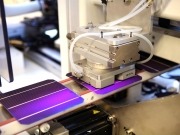
Solar modules made by German-Scandinavian manufacturer Innotech Solar (ITS) have demonstrated an outstanding temperature coefficient in a photon test thereby confirming the modules ability to continue performing efficiently even in high ambient temperatures. This makes the modules more suitable for use in warm countries than many other modules available on the market.
“Many modules show a significant deterioration in performance in warmer regions, such as southern Europe, but ITS modules continue to generate high energy yields even in warmer climates,” said Dr. Thomas Hillig, the Vice President Module Sales & Marketing at Innotech Solar. “As an example, a solar system in Italy with an output of 500 kWp fitted with ITS EcoPlus modules generates around 14 MWh more electricity thanks to the excellent temperature coefficient than a system installed with modules that only have an average temperature coefficient. In warmer regions, this additional yield increases accordingly.”
The modules demonstrated a temperature coefficient of minus 0.39 percent per Kelvin compared to minus 0.43 percent per Kelvin, ranking them among the best PV modules in the photon test field. According to Innotech the modules are manufactured using an innovative process which makes them particularly environmentally friendly with a carbon footprint more than 50 percent below that of conventional European modules. Innotech’s research teams have developed a process to enhance the performance of low-efficiency solar cells by using thermal imaging to detect low-performing cell areas and automatically isolating them with special lasers. The optimized cells are then used by the company to produce its modules.
The cells are thoroughly checked after processing using additional thermal imaging in order to make sure they are free from hot spots which could damage the modules and result in significant yield losses. Tests by independent experts from the Photovoltaik-Institut Berlin and PV Lab among others have also confirmed the modules high performance. They have also been successfully tested for resistance to ammonia and salt spray and have been certified under ISO 9001, 14001 and OHSAS 18001.
Further information:

